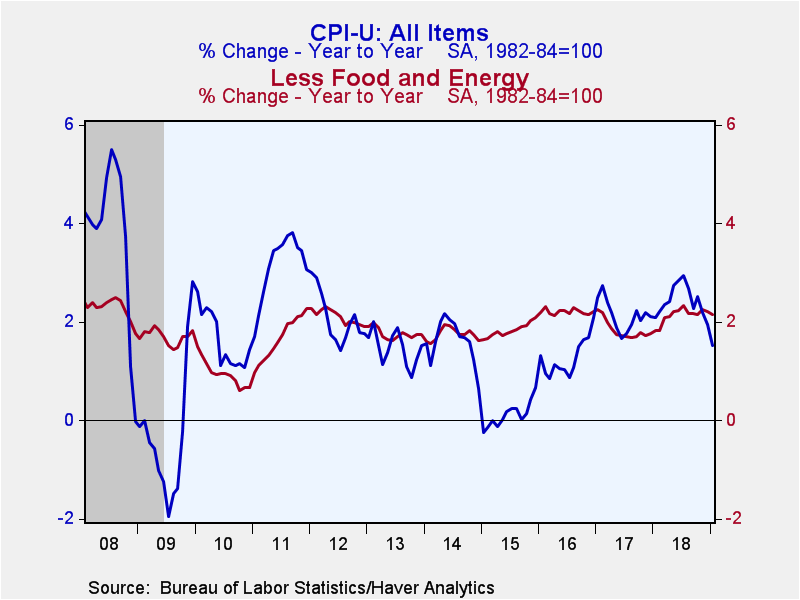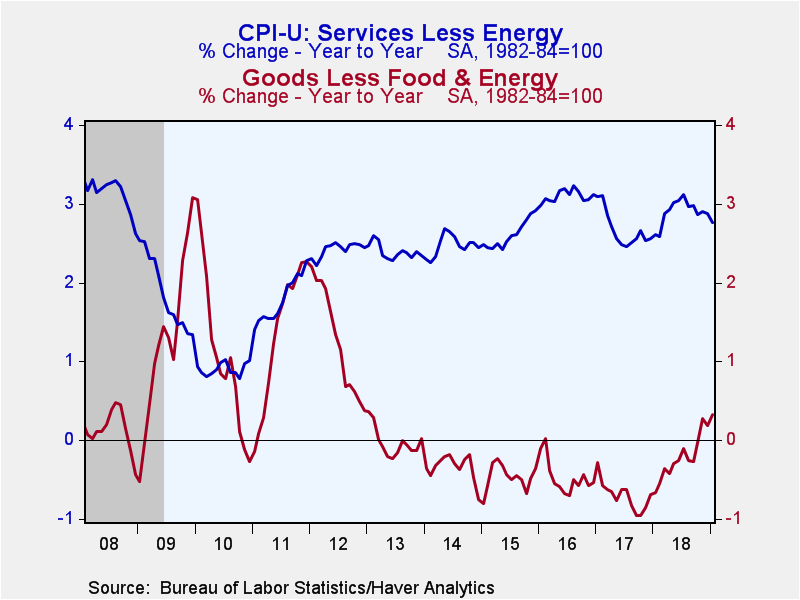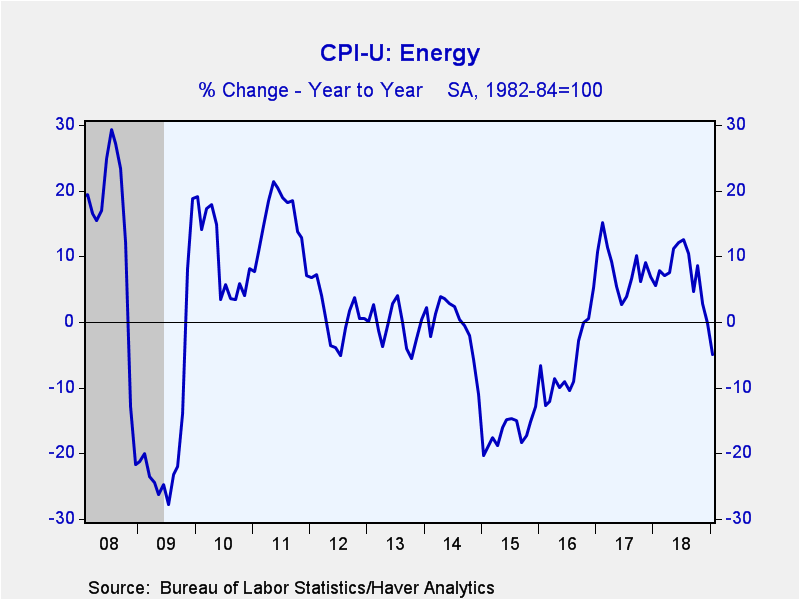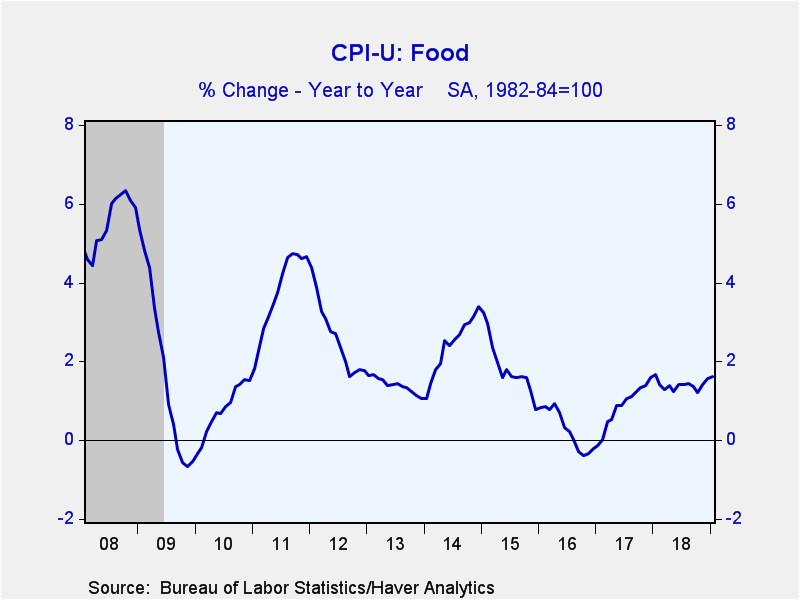 Global| Feb 13 2019
Global| Feb 13 2019U.S. CPI Holds Steady as Energy Prices Decline; Core Prices Increase Steadily
by:Tom Moeller
|in:Economy in Brief
Summary
The Consumer Price Index remained unchanged during January for the third consecutive month. The December figure was revised from -0.1%. Expectations had been for a 0.1% rise in the Action Economics Forecast Survey. The 1.6% y/y [...]
The Consumer Price Index remained unchanged during January for the third consecutive month. The December figure was revised from -0.1%. Expectations had been for a 0.1% rise in the Action Economics Forecast Survey. The 1.6% y/y increase was the weakest since September 2016. The CPI excluding food & energy increased an expected 0.2% (2.2% y/y) for the eighth month in the last nine.
A 3.1% shortfall in energy prices (-4.8% y/y) held back the rise in consumer prices overall. It was the fourth decline in five months and reflected a 5.5% drop (-10.1% y/y) in the price of gasoline. Fuel oil prices declined 1.3% (-8.1% y/y) to the lowest level since December 2017. The cost of electricity fell 0.6% (+0.4% y/y) while the price of natural gas eased 0.3% (+4.3% y/y) following a 5.1% jump.
The rise in the "core" CPI reflected a fourth consecutive 0.2% increase in services prices. The 2.8% y/y rise moderated, however, from its 3.1% peak this past June. Medical care service price inflation eased to 0.3% from two months at 0.4%, and the y/y rise moderated to 2.4%. The cost of shelter increased a steady 0.3% (3.2% y/y) as the owners' equivalent rent of primary residences rose 0.3%, and by a lessened 3.2% y/y. Primary shelter rents increased an improved 0.3% (3.4% y/y). Recreation services prices also improved 0.3% (2.4% y/y) after a 0.2% gain. The cost of education & communication increased 0.2% (0.7% y/y) reflecting a 0.4% gain in the cost of college tuition (2.9% y/y). Working lower by 0.2% (+2.0% y/y) were transportation services costs, reflecting a 0.8% drop (-2.0% y/y) in public transportation prices, which was the fourth consecutive monthly decline.
Goods prices excluding food & energy rose 0.4% following December's stability. The 0.3% y/y gain was the strongest since 2009 and compared to price deflation from 2013 until September 2018. The latest rise was dominated by a 1.4% strengthening (6.4% y/y) in household appliance prices which followed a 0.2% decline. Apparel prices also exhibited strength with a 1.1% rise (0.1% y/y) after holding steady in December. Household furnishings costs gained 0.4% (1.2% y/y) following two months of little change. Recreation commodities prices increased 0.3% (-0.8% y/y) after a 1.1% jump. New vehicle prices rose 0.2% and were unchanged y/y. Medical care goods prices inched 0.1% higher (-0.3% y/y) following a 0.4% decline.
Food prices rose 0.2% (1.6% y/y) last month as meat prices strengthened 0.9% (0.1% y/y). Egg prices also gained 0.9% but were down 3.3% y/y. Dairy product prices declined 0.3% (-0.4% y/y) as did the cost of fruits & vegetables (+0.9% y/y). That followed a 1.4% rise. Cereal & bakery product prices fell 0.4% (+1.0% y/y) after two months of firm increase.
The consumer price data can be found in Haver's USECON database with additional detail in CPIDATA. The Action Economics survey figure is in the AS1REPNA database.
| Consumer Price Index, All Urban Consumers (% chg) | Jan | Dec | Nov | Jan Y/Y | 2018 | 2017 | 2016 |
|---|---|---|---|---|---|---|---|
| Total | 0.0 | 0.0 | 0.0 | 1.6 | 2.4 | 2.1 | 1.3 |
| Total less Food & Energy | 0.2 | 0.2 | 0.2 | 2.2 | 2.1 | 1.8 | 2.2 |
| Goods less Food & Energy | 0.4 | 0.0 | 0.2 | 0.3 | -0.2 | -0.7 | -0.5 |
| Services less Energy | 0.2 | 0.2 | 0.2 | 2.8 | 2.9 | 2.7 | 3.1 |
| Food | 0.2 | 0.3 | 0.2 | 1.6 | 1.4 | 0.9 | 0.3 |
| Energy | -3.1 | -2.6 | -2.8 | -0.3 | 7.5 | 7.9 | -6.6 |
Tom Moeller
AuthorMore in Author Profile »Prior to joining Haver Analytics in 2000, Mr. Moeller worked as the Economist at Chancellor Capital Management from 1985 to 1999. There, he developed comprehensive economic forecasts and interpreted economic data for equity and fixed income portfolio managers. Also at Chancellor, Mr. Moeller worked as an equity analyst and was responsible for researching and rating companies in the economically sensitive automobile and housing industries for investment in Chancellor’s equity portfolio. Prior to joining Chancellor, Mr. Moeller was an Economist at Citibank from 1979 to 1984. He also analyzed pricing behavior in the metals industry for the Council on Wage and Price Stability in Washington, D.C. In 1999, Mr. Moeller received the award for most accurate forecast from the Forecasters' Club of New York. From 1990 to 1992 he was President of the New York Association for Business Economists. Mr. Moeller earned an M.B.A. in Finance from Fordham University, where he graduated in 1987. He holds a Bachelor of Arts in Economics from George Washington University.










